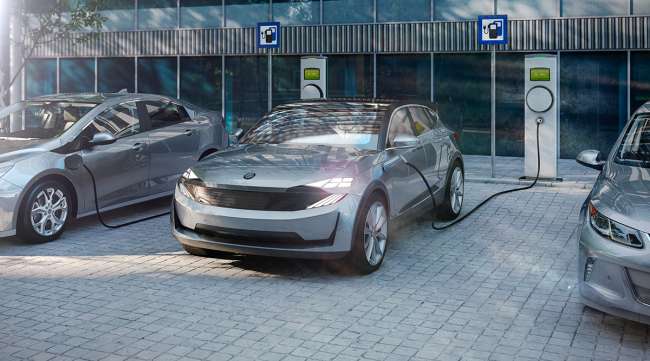Senior Reporter
House Considers Electric Vehicles Legislation

[Stay on top of transportation news: Get TTNews in your inbox.]
Senate-passed legislation meant to promote access to electric vehicles around the country will be under consideration before the U.S. House of Representatives this month.
A House companion bill sponsored by Rep. Ro Khanna aims to provoke government agencies to buy and utilize electric vehicles.
Under the Charging Helps Agencies Realize General Efficiencies (CHARGE) Act, the General Services Administration would issue agencies a charge card for officers or employees with access to electric motor vehicles that meet certain criteria. The distribution of these charge cards would be used to pay for electric vehicle recharging at commercially available stations.

Khanna
“Clean energy is the future of the American economy,” Khanna (D-Calif.) said Sept. 8. “Air pollution from vehicles and smokestacks cause 200,000 early deaths every year in this country. The United States government should be taking every opportunity to support green technology, starting with its own travel policies. This is a simple but effective fix to support American factories, health and innovation.”
“The CHARGE Act will update federal government policy by making common sense changes that encourage government innovation and bring our operations further into the 21st century. I am proud to introduce this bipartisan, bicameral legislation that will help modernize and improve our government,” added Rep. Anthony Gonzalez (R-Ohio), a co-sponsor. After garnering bipartisan backing, the bill is expected to easily pass in the chamber.
CHARGE Act by Transport Topics on Scribd
The Senate last year advanced its version. Sens. Gary Peters (D-Mich.) and Rob Portman (R-Ohio) are the sponsors of that bill.
“Electric vehicles have the potential to be more fuel efficient and more cost-effective than gasoline-powered vehicles, and this legislation will help ensure the federal government can take full advantage of electric vehicles that will save money for Michiganders and Americans across the country,” Peters said in December via a statement from the Homeland Security and Government Affairs Committee. He is the panel’s ranking member.
“If federal employees are required to pay for gas with travel charge cards, they should also be allowed to ‘fill up’ at a charging station when operating an electric vehicle,” added Portman. “I’m pleased that the Senate passed this bipartisan, common sense bill and urge the House to take it up soon.”
Policymakers on Capitol Hill have sought to consider bills pertaining to alternative modes of transportation. They argue facilitating government access to electric vehicles has the potential of incentivizing their purchase nationwide.
Despite progress on electric vehicle legislation, however, policymakers have yet to proceed with legislation that would establish a federal regulatory framework for self-driving vehicles. The current session of Congress wraps up in a few months.

What are fleets doing to help attract the best possible diesel technicians to join the changing workforce environment? Host Michael Freeze speaks with Ken Boyer, dean of the Auto/Diesel Institute at Baker College, and Ralph Romero, vice president of talent management at U.S. Xpress. Hear a snippet, above, and get the full program by going to RoadSigns.TTNews.com.
Rep. Greg Walden (R-Ore.), Energy and Commerce Committee ranking member, recently noted the panel had been unable to finalize autonomous vehicles legislation during the recent consideration of more than three dozen bills.
“We are disappointed that legislation on autonomous vehicles and data protection were noticeably missing at today’s markup,” said Walden, along with fellow Republican leaders on the committee, on Sept. 9.
On the Senate side, transportation policymakers have not passed autonomous vehicles measures. Peters and other colleagues have sought to advance legislation on the policy. The senator from Michigan has repeatedly emphasized potential benefits from deploying the technology, which include expanding access to the elderly and persons with disabilities.
“It’s clear we’re very closely aligned on all of these issues, and hopefully we’ll be able to get some very important legislation across the line as quickly as possible,” Peters said last year. “This is without question probably the most transformative technology in the auto industry since the first car came off of the assembly line.”
Want more news? Listen to today's daily briefing:
Subscribe: Apple Podcasts | Spotify | Amazon Alexa | Google Assistant | More




